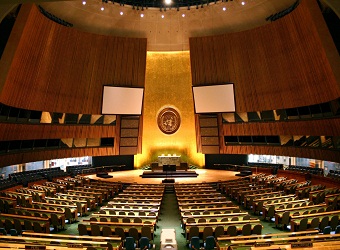U.S. Ambassador to the United Nations Nikki Haley is heading to Vienna later this month to discuss Iran’s nuclear activities with U.N. atomic watchdog officials, a U.S. official said on Wednesday, as part of Washington’s review of Tehran’s compliance with a 2015 nuclear deal.
The official told Reuters that Haley, a member of President Donald Trump’s cabinet, would meet with International Atomic Energy Agency (IAEA) officials and the U.S. delegation in Vienna to further explore the extent of Iran’s nuclear activities.
In April, Trump ordered a review of whether a suspension of sanctions on Iran related to the nuclear deal was in the U.S.national security interest. He has dubbed it “the worst deal ever negotiated.”
Most U.N. and western sanctions were lifted 18 months ago under a deal Iran made with world powers to curb its nuclear program. It is still subject to a U.N. arms embargo and other restrictions, which are not technically part of the deal.
The IAEA polices restrictions the deal placed on Iran’s nuclear activities.
Under U.S. law, the State Department must notify Congress every 90 days of Iran’s compliance with the nuclear deal. The next deadline is October and Trump has said he thinks by then the United States will declare Iran to be noncompliant.
The U.S. review of its policy toward Iran is also looking at Tehran’s behavior in the Middle East, which Washington has said undermines U.S. interests in Syria, Iraq, Yemen and Lebanon.
“Ambassador Haley has consistently voiced her and the administration’s concerns about Iran’s illegal missile testing and other harmful actions,” said the U.S. official, who
requested anonymity.
The United States, Britain, France and Germany have complained several times to the United Nations, most recently last week, about Iran’s ballistic missile launches, which they contend are “in defiance” of a 2015 U.N. resolution enshrining the nuclear agreement.
Under the U.N. resolution, Iran is “called upon” to refrain from work on ballistic missiles designed to deliver nuclear weapons for up to eight years. Critics of the deal have said the language does not make it obligatory.
The United States imposed sanctions on six subsidiaries of a company key to Iran’s ballistic missile program, a day after Iran’s July 27 launch of a rocket that can deliver satellites into orbit.
At the time, Haley said, “The issue with Iran always comes back to mistrust. Iran’s widespread support for terrorists tells us we can’t trust them. Iran’s breaking its obligation on missile testing tells us we can’t trust them.”
Last week, Trump signed into law additional sanctions on Iran, which Tehran said violate the terms of the nuclear agreement.
Source: Reuters


